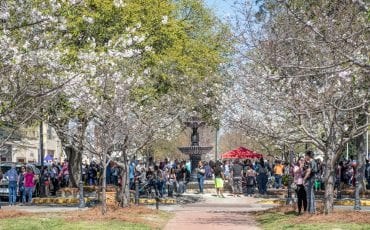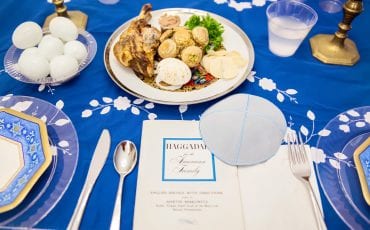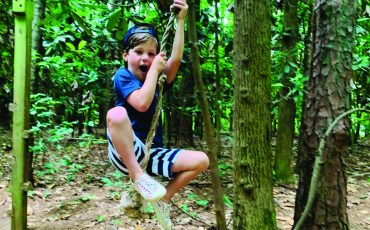Black History Month: In Their Words
compiled by Julie Bookman
Table of Contents
Here are the responses of Gov. Nathan Deal and his wife Sandra, among others, to the question, “How is Black History Month meaningful to you, and what is your hope for its significance to your children and theirs?”
Trudy McLeod of Buckhead is past president and now social chair of the Atlanta chapter of Mocha Moms, a support and activities group for moms of color who do not work outside the home. She and husband Gregory are parents to daughters Gabrielle, 5, Riley, 3, and Gracyn, 1.
Our children are first-generation Americans because my husband and I were both born in Jamaica. Black History Month is not something we grew up with. But here, living in Atlanta, I see this month as an opportunity to learn about a rich history in which a number of black cultures have melded together to create one culture. We may be one race, but we have many cultures, and so this month is an opportunity to learn about the history of the vital role that African-Americans have played in American history.
In our home, our children get their history. This month, our Mocha Moms group will be going to the Alvin Ailey dance performance and I’ll be taking my daughters, and we’re planning a trip to the Auburn Research Library downtown.
I want to encourage families to utilize the resources and the venues that are here, from the Martin Luther King Jr. Center to the Apex Museum. Even if you can’t go to these things in February, find some time, because you don’t want to pay attention to your history just one month of the year.

Kate Whitman is vice president of public programs for the Atlanta History Center, and the mother of Joshua, 18 months old.
The African-American experience is the central story of Atlanta. From Reconstruction to the civil rights movement and dealing with race relations, and from the Jim Crow era to the formation of black colleges, it’s all an important part of the story that has structured this city. Still today, Atlanta is a mecca for black industry, from entertainment to publications and corporations.
I think it’s important to have a month when we look at the untold stories and contributions of everyday African-Americans. We know about Martin Luther King Jr., and his contributions, but what about the children who were part of the civil rights movement, and other everyday people? I think that’s why people revere Rosa Parks so much, because she was just an ordinary person who took a big stand. Her story is a reminder than anyone, really, can have an impact on history.
It is important that my son know his history. I think it is hard for kids today to imagine an Atlanta that was segregated, and yet it was not very long ago that Atlanta schools were. I hope that he does not take for granted that the multicultural city he lives in was made possible by brave men, women and children who were willing to fight for what is right.

Barbara Catledge Hall, mother of three, is a career advisor for Fulton County Schools’ talented and gifted department. Her great-great grandmother was a slave in Alabama.
History is “his” story, and the “his” has traditionally not meant black people. Now there is more of our history written by us, so that’s great. Still, it’s important to keep our story alive, what we’ve passed on orally, for future generations. It’s hard for the younger generations to relate unless its through the social media they’re familiar with.
Black History Month is important because it helps me to remember. My world is black and white, but it’s also not. I am open to the global world. I think it’s important to take time to celebrate who we are and where we came from and where we are going. Because if you don’t know your history, then your future is blurred.

Gov. Nathan Deal and first lady Sandra Deal have four adult children and six grandchildren.
The state of Georgia boasts a proud heritage of African-American achievement. We are home to African-American titans of political leadership, artistic creation, academic scholarship and economic development. Georgia has the largest representation of African-American representatives in its state Legislature, and sent more African-Americans to the U.S. House of Representatives than any other state.
African-American innovators in music, literature and visual art have influenced cultures throughout the world. Our historically black universities, such as Morehouse, Spelman and many others, have educated the minds and improved the lives of countless graduates. Georgia is home to a number of African-American enterprises that are key players in the global economy.
The contributions that African-Americans have made to the state of Georgia and society at large are invaluable and deserve appreciation. Black History Month should not just be a month of reflection and homage, but a month of education and enlightenment.

Cynthia Tucker is a Pulitzer Prize-winning syndicated columnist and a Visiting Professor of Journalism at the University of Georgia’s Grady College. She lives in Atlanta with her 3-year-old daughter, Carly.
My 3-year-old, Carly, was just a month old when President Barack Obama was inaugurated. As my mother and I watched the festivities on television, taking turns holding my precious newborn, we envisioned the nation in which my little girl would grow up. We talked about a future in which the election of a black president is no longer, by itself, noteworthy; in which black men and women are well represented in the nation’s highest offices; in which the sight of black children cavorting on the White House lawn would no longer be unusual.
In that future, Black History Month wouldn’t be necessary because the history of black Americans would have been fully integrated into the history of America. In elementary school social studies classes and high school civics classes, students would learn about black cowboys, black soldiers and black inventors as they learned the significant chapters in the national story.
For now, Black History Month remains a crucial device for teaching students the too-often neglected stories about the contributions of black Americans. By the time Carly has her own children, I hope it’s no longer needed. c








